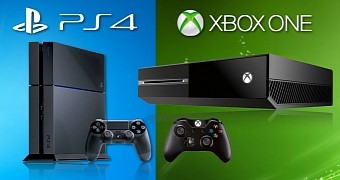The Xbox One and PlayStation 4, just like their forebears, have a tendency to polarize discussions into two distinct camps, and their most vocal members usually start flaming each other, whenever there are discussions pertaining to... well... pretty much anything.
This unfortunate fact is a part of life, and we really have no control over it, other than maybe trying to educate those who are misinformed and refraining from further interacting with those who show themselves too close-minded.
Status
Almost everyone is saying that the PlayStation 4 is a much better choice over the Xbox One, other than those who bought Microsoft's device, of course, fueled mostly by their own status as PS4 owners and some of the magical anti-PR that the Redmond-based company managed to pull off over the course of last year.
The latest talk of the town is the fact that the PlayStation 4 is marginally better than the Xbox One as far as its GPU and memory make-up is concerned, with Microsoft's next-gen computer entertainment system being also the victim of its limited 32 MB of ESRAM, which many developers decried.
The latest rage is picking on the Xbox One for its inability to reach 1080p, many cross-platform games running at 900p resolution on the platform, as opposed to the native 1080p of the PlayStation 4.
Facts
Both consoles' hardware is outdated, and their only advantage is the unifying property of having the same hardware in every home, which makes development easier and ensures that everyone gets the same experience.
In their recent interview with Digital Foundry, 4A Games, makers of the Metro series and the just-released Metro Redux, the revamped version of the two titles, remastered for current-generation consoles, made some interesting reveals.
The developer managed to get the pretty demanding games to run on both consoles at a steady 60 frames per second, albeit the Xbox One edition was running at a lower resolution of just 912p. That resolution disparity is, however, pretty hard to notice, and apart from the psychological relief of knowing that it's running in 1080p, you're not really getting much.
The developer also made note of the fact that both Sony and Microsoft have been steadily improving the development environment for both platforms, and the most recent development kits, such as the post-Kinect one for the Xbox One, allow developers much more freedom, and, thus, the power to create better products.
While the PS4 is natively stronger, the Xbox One is also catching up, and the latest dev kit updates include more of the features that will be delivered in DirectX 12. DX11 functions more like an accountant that keeps leering at your code over your shoulder, always wanting to know everything that's going on.
DX12 offers more direct hardware control and eliminates much of the current CPU overhead, just like AMD's Mantle application programming interface aims to do.
Resolution
The Resolutiongate scandal is only secondary to the real issue at hand, which, as far as consoles go, is games. There are currently not enough games on either console to keep users interested, so they have to resort to pointing out information that is largely irrelevant in the long run.
When Naughty Dog creates its next PlayStation 4 exclusive masterpiece, then you will have a good reason to pick on Xbox One owners. Until then, there's really not that much to talk about.
If the Xbox One console still struggles to keep up with the PS4 improvements a year from now, that is a good reason to ridicule it. But until then, it's just a fresh system with a couple of quirks, just like the PlayStation 3 was at the start of its life cycle, and it too paid the price.
Sony learned its lesson, it made the PlayStation 4 stronger and easier to develop for, and now it's Microsoft's turn to play catch up, and hopefully they will.
My only concern for the time being is what will happen when PCs start greatly outstripping console capabilities. The last generation of consoles was a few steps ahead of the state of PC hardware at the time, but this generation already started on the back foot.

 14 DAY TRIAL //
14 DAY TRIAL //